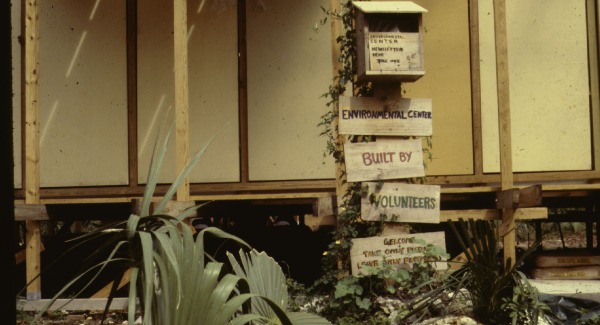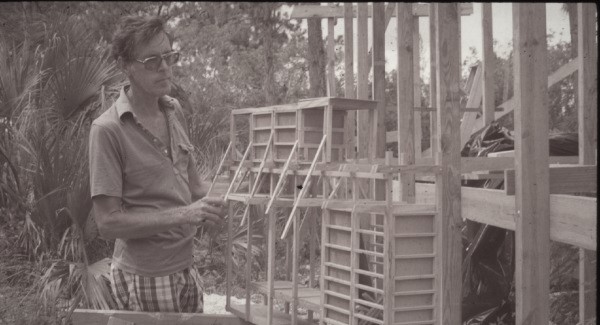History of Earth Ethics Institute

The Environmental Center, c. 1978

EEI Founder, McGregor (Mac) Smith Jr.
In 1976, McGregor (Mac) Smith Jr. presented the seed of an idea to the (then) Miami Dade Community College (MDCC) Board of Trustees with the vision that it could grow into a self-supporting Environmental Demonstration Center (EDC).
In 1978, a group of individuals broke ground and planted that seed. From that ground on the West side of Kendall Campus, the Environmental Demonstration Center (now the Environmental Center) sprouted up. The EDC was a Wolfson Campus program but it was located adjacent to Kendall Campus.
Over the following ten years, the Center grew, developed, and evolved into a unique tree with branches for an Owner-Builder Center, a Landscape Center, a Tropical Lifestyle Center, and a Nature Center. In addition to these, by 1988, Mac Smith and Norma Watkins had established the Environmental Ethics Institute that offered credit and non-credit courses in Earth Literacy. And by that time, the Institute’s roots had already spread beyond Miami Dade College, to St. Thomas University in Miami, to Southwestern College in Winfield, Kansas, and to the Highlands Center in North Carolina.
Around that time, Mac also came to know Miriam MacGillis. Miriam and the Dominican Sisters of Caldwell, New Jersey had founded Genesis Farm in 1980. Well-rooted in the work of Thomas Berry, Miriam had begun her own work in Earth literacy creating the Cosmic Walk, a ritual that brings knowledge of the 14-billion-year-Universe-process, from one’s head to one’s heart. Miriam further grounded the Environmental Ethics Institute in Earth Literacy, and Genesis Farm became part of the Earth Literacy Network.
Bill Nickle, devoting decades to Earth-work with children and adults, founded the Narrow Ridge Earth Literacy Center in Tennessee in the late 1970’s. When Bill attended a seminar in North Carolina where Mac presented his ideas on Earth Literacy, Mac’s message resonated with him, and as a result, Narrow Ridge came into the Earth Literacy Network.
By 1990, Mac had raised funds for a million-dollar endowment to the Miami Dade College Foundation, to sustain the Environmental Ethics Institute.
The EEI Advisory Board was established to oversee the EEI endowment, the Institute’s annual activities, to make recommendations to the College Leadership about the functioning of the Institute, and to ensure that its mission was being realized. The original board included McGregor Smith Jr., Norma Watkins, Tim McGuril, Miriam MacGillis, Ross McCluney, Joe Iannone, Dan Daniel, Bill Nickle, and Jon Villamil.
Then, in 1992, Hurricane Andrew caused some damage to the Environmental Demonstration Center and the College decided to raze the building. EDC programs were displaced, and the Environmental Ethics Institute established an office on Wolfson Campus.
The Institute’s focus shifted from student-based programs, to a faculty-based program, with the idea that Earth literate faculty were needed in order to teach students in ways that would prepare them for an Ecozoic Age.
In order to accomplish this, the Institute’s co-directors Norma Watkins and Tim McGuirl began a faculty training program in Earth Literacy using Thomas Berry’s The Dream of the Earth, as a text. This first group of faculty produced a multi-disciplinary resource called EDGE (Environmental Dimensions in General Education).
That first group of faculty included Phyllis Baker from Social Science; Paul Dirks from Math; Paul George from History; Marilyn Gottlieb-Roberts from Art and Humanities; Michael Hettich from English; Brad Stocker from ESL; and John Villamil from Natural Science – along with Norma and Tim.
But EEI didn’t limit its focus on faculty for long.
In 1995, the Institute launched its Eco-Urban program with 20 honors students living at the Miami River Inn. The unique program provided an intensive year in a learning community that taught Earth Literacy and how to live more sustainably in an urban setting. The program was the brain-child of Norma Watkins and Deena Blazejack, and along with Joyce DiBenedetto-Colton, this teaching team began an astounding six-year journey.
In 1997, Dr. Leslie Roberts stepped into the EEI Director’s position, and served as resident faculty for the Eco-Urban program, relieving Deena of that duty.
That same year (1997), Mac’s book Now That You Know: A Journey Toward Earth Literacy was published by EarthKnows Publications, the Narrow Ridge Center’s imprint.
In 1999, the same year Thomas Berry’s book The Great Work was published, the College hired Sandra Schuh as the EEI Director. This was a year in which the Institute reexamined its direction, and its place within the College.
In 2000, Joyce DiBenedetto-Colton served as Interim Director for the Institute. This was the year that final negotiations were taking place to establish a faculty union at the College. And, despite the difficulties inherent in the emergence of a faculty union, and amid the loss of the Miami River Inn as the site for the Eco-Urban program, the Institute grew a group of dedicated Core Faculty that collaborated in developing the first Green Studies Workshops approved for professional development credit.
The Eco-Urban program transitioned to an on-campus honors program at Wolfson, being renamed the Environmental Fellowship Program.
In 2001, the Institute found its next Director in Sr. Patricia Siemen. Sr. Siemen and the Core Faculty remained rooted, and over the next three years we added immersion workshops to the Green Studies offerings. Additionally, a full-time assistant position was finally approved, making more programming possible.
As the Environmental Ethics Institute gained more attention at the College, we found we were often being confused with the Environmental Science program at North Campus, and the Environmental Center at Kendall Campus. Additionally, the term “environmental” was typically used in fields of environmental management – often at odds with the natural-world’s systems, non-human life-forms, and Earth jurisprudence.
It was decided that the purpose and mission of the Institute would be more accurately conveyed by changing its name to “Earth Ethics Institute.”
In 2004, Colleen Ahern-Hettich became the Director of the Earth Ethics Institute. Under her directorship, the Institute broadened its mission to include fostering Earth Literacy not only in every discipline within the College, but fostering Earth Literacy and sustainability in departments and operations as well. In 2006, MDC's president, Dr. Eduardo Padrón, signed the Talloires Declaration, a ten-point action plan for incorporating sustainability and environmental literacy in teaching, research, operations, and outreach at colleges and universities. As a result, MDC administration and staff were invited to participate in governing the Institute. The Core Faculty, who served to guide the institute, became the EEI Council. In addition, EEI began collaborating with other local and national organizations interested in bringing about a sustainable South Florida and the mission expanded to include the South Florida community and greater community beyond.
In 2012, EEI worked with faculty to create the Global Sustainability and Earth Literacy Studies (GSELS) learning network, a network of inclusive educational opportunities for the Miami Dade College community to explore global citizenship, ecological sustainability, and civic engagement through understanding planetary challenges and limits, and by developing values, skills, and behaviors that promote prosperity and communities of well-being. GSELS was piloted in the 2013-14 academic year.
Additional Historical Resources
To view historical photos and scans of EEI's historical documents, visit our LibGuide.